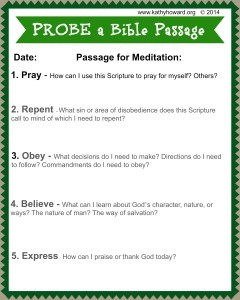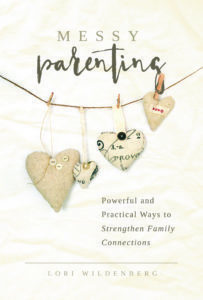Kathy Howard's Blog: Unshakeable Faith for Life, page 30
November 12, 2018
6 Biblical Principles for Handling Personal Conviction in the Church

I am so glad the mid-term elections are over! Politics cause far too much disagreement – even in the church. With good conscience and personal conviction on both sides, sincere Christians can be divided over party lines. It’s one of those areas like alcohol, homeschooling, and the environment – where we need to learn to lovingly disagree.
So, how do we approach topics like these within the body of Christ? The principles Paul gives in Romans concerning disputes over eating and drinking can be applied to these and other issues.
First, let’s clarify – we must not “agree to disagree” concerning behaviors and attitudes that God clearly calls out as “sin” in His Word. The Bible tells us that believers are ABSOLUTELY TO JUDGE those things within the church and hold other believers accountable to holiness (1 Corinthians 5:1-13). For more about judging see “To Judge or Not to Judge?”
In Romans (Romans 14:1-21), Paul gives guidelines for dealing with matters of personal conviction. (The ESV translates them as “opinions” and the NIV translates them as “disputable matters.”) These are behaviors God has not clearly labeled as sin, but Christians disagree on whether or not they are “right” or “wrong.”
Sadly, just like the Christians in Rome, believers today often judge another believer’s motives and actions regarding OPINIONS. Although the Roman Christians disagreed over issues like eating meat and celebrating certain days, the principles Paul gave them can be applied to our disputable matters today.
7 biblical principles for handling personal convictions
Accept believers with different opinions on disputable matters (vv 1-4) – Disagreement on secondary issues does not have to mean division.
Seek God’s wisdom and follow our conscience (vv 5, 23) – These kinds of matters are between an individual and God. Another person cannot decide for you.
Honor God in all we do (v 6) – We should always seek God’s approval first and foremost.
Do not judge another believer’s motivations (vv 10, 13) – We can only judge behavior, not the motivations behind it. God will judge the heart.
Put other’s needs ahead of our own (vv 13, 15, 19, 20-21) – We should not exercise our freedom if it will harm another believer. (See “Having the Right Doesn’t Make it Right.”)
Keep our opinions about disputable matters (not sin) to ourselves (v 22) – Arguing over matters of personal conviction can only bring harm to the body.
Following these principles may mean we say “yes” to something in one situation and “no” to the same thing in a different situation.
6 Biblical Principles for Handling Personal Conviction in the Church by Kathy Howard.
October 29, 2018
I Am Not Enough, But…

I am not enough. I am not good enough. I am not strong enough. I am not wise enough.
I am not enough. And neither are you. You are not enough.
Last week I heard a song on my local Christian radio station that troubled me. The lyrics repeatedly sang “I am enough.” Without qualification. No mention of what Jesus did and gave on our behalf.
Quite possibly the intention of the song is that with Jesus we are enough. But it does not say that. And that’s what troubled me. Whether intentional or not, the song reflects a pervasive worldly attitude that has filtered into the church.
In his 2017 article, “Should Churches Promote High Self-Esteem,” author Joshua Clayton explains why trying to foster high self-esteem is contrary to biblical principles:
“The promotion of the self-esteem concept was originally designed to fit into the paradigm created by psychologists in their finite understanding of man’s true needs separate from Scripture… everything psychology suggests for man’s ultimate need is completely contrary to God’s Word. Choosing to esteem self is the exact opposite of what Scripture teaches regarding the believer’s trajectory… The ultimate goal of seeking to promote high self-esteem is to teach man to depend on man, whereas the ultimate goal of Christianity is to show man that, apart from God, we can do nothing (John 15:5).”
Why We are Not Enough
The Bible clearly teaches we are “not enough.” None of us can meet God’s glorious and holy perfection. Not a single one of us deserve Him. For all have sinned and fall short of the glory of God (Romans 3:23).
In fact, we all deserve death and eternal condemnation. “For the wages of sin is death…” (Romans 6:23a). We are not enough. We cannot save ourselves.
But wait… when we couldn’t do it, when we were weak, when we weren’t even aware of God…
You see, at just the right time, when we were still powerless, Christ died for the ungodly (Romans 5:6).
There was nothing we could do to save ourselves. We could never be good enough. We could never work hard enough. Ah… but we didn’t have to.
For by grace you have been saved through faith. And this is not of your own doing; it is the gift of God, not a result of works, so that no one may boast (Ephesians 2:8-9).
Nope, I am not enough. You are not enough. And that’s exactly why Jesus gave His life for us. None of us are enough. But Jesus is more than enough. (Find out more about how to have a saving relationship with Jesus.)
When I am…
Jesus wants us to recognize our weakness and limitations so we will learn to depend on Him. When we erroneously believe we “are enough,” we become self-sufficient, independent, and prideful. God invites us to bring our limitations and weakness to Him. He supplies what we lack.
I am helpless, but God is my Helper (Hebrews 13:6).
I am weak, but God is my strength (2 Corinthians 12:9-10).
I am a sinner, but Jesus is my righteousness (Romans 10:4).
I deserve death and destruction, but Jesus is my life and my salvation (1 Thessalonians 5:9).
I am hopeless, but Jesus is my hope (Romans 5:2).
No, you are not “enough.” But you are chosen. You are loved. You are wanted. You are forgiven, adopted, redeemed and restored. We are not enough. But Jesus is more than enough and that’s all that we need.
October 22, 2018
6 Simple Ways to Comfort the Grieving

My father passed away four weeks ago. This week, my brother, sister-in-law, and I are getting Mom settled in a memory care facility close to my brother’s place. Now, in the latter stages of Alzheimer’s, Mom needs more help than she can get at home.
It’s been a difficult month.
No human can fix this. Or change the circumstances.
But even so, many have come around us in these days to help. And God has used their efforts to comfort, encourage, and strengthen us.
It’s amazing how God can take seemingly small things, simple gestures, and use them. Only God, through His people.
Only God.
As I reflect on these gifts of grace, tears flow again. Yes, there is grief. But there is also thanksgiving. Gratitude to God that in the midst of difficulty He sweetly cares for me, His child.
Blessed be the God and Father of our Lord Jesus Christ, the Father of mercies and God of all comfort… (2 Corinthians 1:3, ESV)
God has comforted me through His people. Even in the small things. Maybe especially in the small things.
Perhaps someone you know is grieving a loss. Here are a few of the “small things” you can do that meant so much to me.
6 Small Acts that Gave Me Comfort
Contact – Whether you call, text, message, or send a card just let them know you care, that you are thinking of them. I’ve gotten scores of these and it’s made a difference.
Remember – Extended family members and friends shared stories and told me how much Dad meant to them personally. He impacted lives. This happened in person, in cards, and even on social media, and every time it brought comfort and sometimes a smile.
Show up – Whether at their door or at the services, your presence makes a difference. You don’t even have to say anything. Just being there is a comfort.
Pray – Pray for them. And let them know you are praying for them – immediately and later on.
Ask – It’s only happened a couple of times, but it was uniquely comforting. People who didn’t know my father asked me to tell them about him. And they listened.
Listen – I know I just said that. But it’s important enough to repeat. Listen to them talk about their loved one, the plans, how they’re feeling. Talking is healing and you can listen.
I am not a counselor. And I don’t have a lot of experience with grief. But I do know what helped and is helping me. And I thought it might help someone you know.
By the way, one of the greatest sources of comfort is the assurance I have that Dad is with Jesus now. Death was just a doorway into a greater spiritual reality. (For more on this see “Holding onto Hope.”)
What helped you when you were grieving?
October 1, 2018
Dad has Finished the Race

On September 23, my father finished his race and received his eternal inheritance. His soul has been in the presence of his Savior for a week. Today, we say our formal goodbyes. While we grieve the loss of Dad’s presence with us, we also rejoice that he has now received the goal of his faith.
We intentionally planned today’s services to celebrate this godly man who spent his life walking with Jesus. Paul’s words in his second letter to Timothy could have been written by Dad.
I have fought the good fight, I have finished the race, I have kept the faith. Henceforth there is laid up for me the crown of righteousness, which the Lord, the righteous judge, will award to me on that day (2 Timothy 4:7-8a).
The Bible repeatedly uses the image of a race to represent a believer’s life on this earth. Those who have trusted in Christ for our eternal salvation are called to lay aside everything that may hinder us and “run with endurance the race that is set before us” (Hebrews 12:1). Our focus is Jesus. Our prize is eternity in His presence.
Our father made Jesus the foundation and goal of his life. We want the service to reflect that. We want to acknowledge the joy of his homegoing even as we grieve the loss of his presence with us.
We chose joyful hymns that sing of Dad’s spiritual reality.
When we all get to heaven, what a day of rejoicing that will be. When we all see Jesus, we’ll sing and shout the victory.
And…
Victory in Jesus, our Savior forever. He sought me and bought me with His redeeming love.
We searched Dad’s Bible for passages he had marked.
We wanted to read Scripture that meant the most to him. He marked words that reminded him of his security in Christ:
Who shall separate us from the love of Christ? Shall tribulation, or distress, or persecution, or famine, or nakedness, or danger, or sword? No, in all these things we are more than conquerors through him who loved us. For I am sure that neither death nor life, nor angels nor rulers, nor things present nor things to come, nor powers, nor height nor depth, nor anything else in all creation, will be able to separate us from the love of God in Christ Jesus our Lord.Romans 8:35, 37-39, ESV
Dad marked verses that pointed to his eternal home:
“Let not your hearts be troubled. Believe in God; believe also in me. In my Father’s house are many rooms. If it were not so, would I have told you that I go to prepare a place for you? And if I go and prepare a place for you, I will come again and will take you to myself, that where I am you may be also.” John 14:1-3, ESV
Legacy of Faith
Dad also marked numerous passages that challenged him to focus on the eternal and not the spiritual. He underlined multiple Scriptures that describe the life of a true disciple. And that’s what my father was – a true disciple of Christ.

Everett Ray Head left a strong spiritual legacy. Daddy dearly loved his family and friends, but loved Jesus first and most. He spent his life closely following Jesus, faithfully serving the body of Christ, and loving his neighbor as himself. He was a godly father, an encouraging son and brother, and a kind and generous neighbor. If he saw a need, he met it with no expectations. He had a burden for the lost and boldly shared that salvation is found in Jesus alone (1 John 5:11-12).
So today, I will boldly follow my father’s footsteps. Do you have a saving relationship with Jesus? If not, find out more about eternal salvation. Only Jesus can provide a way to God the Father. He is our only hope.
September 17, 2018
The Armor of God is More than a Prayer

The Bible is full of word pictures to help us understand spiritual truths. One of the best known and most loved is the armor of God Paul describes in Ephesians.
I know some Christians who “pray on the armor of God” every day. While we definitely need that level of awareness, the spiritual armor we need to “stand against the schemes of the devil” is not simply a rote prayer before we start our day.
Christians are Fighting a Battle
This passage (Ephesians 6:10-20) is a battle call. Our opposition is real. Satan and his forces are fighting to prevent us from experiencing everything God has for us. They want to shake our faith, to make us fall. They scheme to derail us from living the full life of faith Jesus died to give us. Satan is powerful, wicked, and cunning. But he is no match for God.
Yes, God calls us to pray at all times (Ephesians 6:18). And prayer is the over-arching key to winning the spiritual battle. But this prayer is active. We are not simply to “pray” the armor but to “put on the whole armor of God.” Then get in the trenches and join God in the fight.
God provides His strength as we fight with His armor.
The “Armor of God” Represents Spiritual Principles
Paul was very familiar with the armor of the Roman soldier. While the list in Ephesians 6 is not exhaustive, the elements Paul cites were key to the soldier’s protection and victory. Let us “put on” the armor of God represented by these ancient pieces and fight alongside God for the spiritual victory!
Know God’s Truth (Belt of truth) – Here we find two-levels of meaning. First, we must know God’s truth in order to recognize and reveal Satan’s lies. Second, when we maintain sincerity and integrity in our lives, we will not give Satan any ammunition to use against us.
Live a Holy Life (Breastplate of righteousness) – Like the soldier’s breastplateprotected him from and back covering all the vital organs, a Christian’s righteousness protects her spiritually. Commitment to holy living and purposeful guards on our hearts and minds help us resist Satan’s temptations. (See “5 Benefits of Living a Holy Life.”)
Keep the Gospel Central (Gospel Boots) – When we keep a constant awareness of the Gospel of Christ our firm footing is established and we are equipped to share the Gospel with others, rescuing them from an eternity separated from God.
Hold on to Faith (Shield of Faith) – Our faith in God – knowing who He is and remembering His promises for us – will quench all the arrows of doubt, quilt, and fear the accuser shoots at us. Remembering who you belong to and what He has done for you will protect you like the soldier’s shield covered his whole body.
Rejoice in eternity (Helmet of Salvation) – The enemy of your soul has no power over your eternity. If you have a saving relationship with Jesus, you belong to God and are protected by His Spirit. Reflect on this truth and rejoice!
Use the Word (Sword of the Spirit) – The Word of God is a powerful, two-edged sword. God not only uses it to reveal our hearts and refine our faith, it is also our weapon of offense against the enemy. Study it. Dwell on it. Root yourself in the Scripture so you will be equipped to defeat Satan and his schemes.
Yes, let us pray as we fight the spiritual forces of evil. Always, without ceasing. But let us also live the spiritual principles represented by the armor.
Is this way of looking at the armor of God helpful to you? If so, in what way?
September 10, 2018
5 “Probing” Questions to Help You Meditate on Scripture

(This post includes a free printable to use as a tool to meditate on Scripture.)
If we want God’s Word to do its best and most comprehensive work in us, we must meditate on Scripture. Like tough meat requires low, slow heat to tenderize it, we stubborn humans need to ruminate on the rich truths of God’s Word in order to get the most life-changing benefits.
What is biblical meditation?
True biblical mediation is NOT anything like the meditation of Eastern religions and mysticism. The goal of Eastern meditation is to empty the mind of conscious thought. When a Christian mediates on Scripture, her goal is to fill her mind with spiritual truth in order to better understand it, apply it, and be transformed by it.
“Meditating” on a Bible passage includes the ideas of pondering, contemplating, questioning, reflecting, thinking, speaking, and musing. It’s taking apart a Scripture and deeply and thoroughly inspecting it from every angle to discover everything God has for us within it.
How do we mediate on Scripture?
One of the best ways to meditate on Scripture is to ask questions of a verse or passage that particularly impacted you as you read. Linger over that verse or verses and ask God questions. “Listen” for His answers and record what He says in a journal. Below are five “starter” categories you can ask of the passage. These five categories of questions form the acronym PROBE:
Pray – How can I use this Scripture to pray for myself? Others?
Repent – What sin or area of disobedience does this Scripture call to mind of which I need to repent?
Obey – Does this Scripture point out decisions I need to make? Directions I need to follow? Commandments I need to obey?
Believe – What does this Scripture teach about God’s character, nature, or ways? About the nature of man? The way of salvation?
Express – In what ways does this Scripture prompt praise or thanksgiving?
Feel free to print the PROBE meditation sheet for future use!
 This is just the beginning. The Bible tells us we can mediate on God’s Word “day and night.” Those moments we spend with the printed Word in front of us, plants it in our hearts and minds so we can turn our thoughts back to it again and again throughout the day. We can speak it to ourselves and talk about it to others.
This is just the beginning. The Bible tells us we can mediate on God’s Word “day and night.” Those moments we spend with the printed Word in front of us, plants it in our hearts and minds so we can turn our thoughts back to it again and again throughout the day. We can speak it to ourselves and talk about it to others.
What are the results of biblical meditation?
As we consistently and constantly meditate on the truth of God’s Word, we will not remain the same. God will use His truth to transform, use, and bless us!
Oh, the joys of those who do not follow the advice of the wicked, or stand around with sinners, or join in with mockers. But they delight in the law of the Lord, meditating on it day and night. They are like trees planted along the riverbank, bearing fruit each season. Their leaves never wither, and they prosper in all they do. Psalm 1:1-3, NLT
5 “Probing” Questions to Help You Meditate on Scripture by Kathy Howard.
September 3, 2018
Bible Highlighting for More Effective Study

Want to get more out of your time in the Bible? There are various study methods out there – and I use several – but today I want to share the way I do Bible highlighting.
I certainly didn’t create the method. But after seeing others doing it for a while, I came up with a color coding system that made sense to me.
What is Bible Highlighting?
Bible highlighting is a system of marking or color-coding a Bible passage in order to dissect it for more effective study. I’ve found it beneficial in at least 3 ways:
Focus – Because I’m thinking about what parts of the passage I should highlight in the different colors, I find pay more attention to what I’m reading.
Understanding – Because I’m focusing and reading the passage more than once, I get better clarity on the passage.
Application – The process itself helps me see how God would have me apply these truths to my life.
A Few Bible Highlighting “How To” Tips:
This is not a scientific method. When we are prayerfully in God’s Word, we are communicating with Him. So, be sensitive to His leading. Allow the Holy Spirit to be your teacher. However, here are a few tips, thoughts, and suggestions to help the study process:
Start with prayer – If you are a believer, the Holy Spirit lives within you. He is your teacher. Ask Him to give you understanding.
Keep the context in mind – Every Bible passage is part of a larger passage, a chapter, a book. It’s easy to misunderstand a passage when we don’t know the context. For more about context see “4 Things to Consider for Biblical Context.”
Read without highlighting – Read the passage at least once before you begin marking it. Get the feel for the whole thing before you begin to break it down.
Start with the obvious – On the second reading, I begin highlighting portions of the text that are the clearest. For instance, sometimes it may be a direct command. Others it may be a glorious truth about God. I start with what the Holy Spirit makes obvious first.
Make connections – With the obvious pieces marked, another reading will often help bring the other portions into focus. Ask the Holy Spirit to help you understand the relationship between the pieces.
Respond – Don’t leave the passage without asking God to show you how He wants you to apply what He’s taught you. Then do it!
My Bible Highlighting Color Code
 I’ve seen different color codes. Really, this is so personal. The one I use is very basic and works for any passage. It also makes sense to me so I would remember it! For instance, “purple” reminds me of royalty, thus I use it to highlight everything I learn about our King! Use mine, use someone else’s or develop your own!
I’ve seen different color codes. Really, this is so personal. The one I use is very basic and works for any passage. It also makes sense to me so I would remember it! For instance, “purple” reminds me of royalty, thus I use it to highlight everything I learn about our King! Use mine, use someone else’s or develop your own!
PURPLE – Truths about God, His character, His ways
ORANGE – Key words and phrases (watch for things repeated over and over!)
YELLOW – Important facts, spiritual truths
BLUE – Commands to obey
GREEN – Spiritual insight for application
PINK – Things I don’t understand or need to study further
A few More Suggestions for Success
Get a journaling Bible – mine is large print, heavier paper, and wide margin! The wide margins are perfect for making study notes and doing a little “Bible art.” The heavier paper cuts down on the bleed through. Here’s the Bible I’ve been using.
Be prepared – Keep all your supplies together in one. Ideally, it should be where you spend your daily time with God.
Have a plan – Haphazard Bible reading and study will always be haphazard. Find and use a Bible reading plan. I have several on my resources page.
What Bible study methods do you use? Which ones do you find most helpful?
Some links you may find helpful:
Color Coding Bible Study Method
Using Highlighting and Color Coding to Enhance Your Bible Study
Women Living Well – Soak Bible study method and Coloring Chart
5 Probing Questions to Help You Meditate on Scripture
Bible Highlighting for More Effective Study by Kathy Howard.
August 27, 2018
A Determined Mom on a Mission

Never mess with a Mom on a mission. A determined mother will do whatever it takes to get to Jesus and ask for what Her child needs most. (Today’s post is written by Lori Wildenberg, author of the new book “Messy Parenting!“)
The anonymous Canaanite woman (Matthew 15:21-28) knew what she needed. She knew only Jesus could answer her prayer and she was determined to do whatever it took to get to Him. She was persistent.
She was a mom on a mission.
Her name isn’t given, but it doesn’t need to be because…she is every mother. She is you. She is me.
“Lord, son of David, have mercy on me!” She cried out.
She was in agony. Like any mama, she was physically experiencing her child’s misery. “My daughter is suffering terribly from demon-possession.” Or… “My child is suffering terriblyfrom a broken relationship, an illness, an injury….”
She would not be discouraged or dissuaded, even though the disciples urged the Lord to send her away. At the very least, this Gentile woman was distracting, annoying. The men whined, “She keeps crying after us.” That motley crew of twelve was not going to get in her way. (Never mess with a determined mother.) She knew who and what she needed. This mom persisted in her humble and honest cries that come from a broken heart.
But Jesus…He was quiet.
Waiting is the Hardest Part for a Mom on a Mission
Isn’t that the hardest part? We cry out, beg, chase after him on behalf of our children…and He is quiet. She needed what only Jesus could provide. She was not about to leave His presence empty-handed.
Even when Jesus said, “I was sent only to the lost sheep of Israel” she didn’t give up. Instead of tossing her arms in the air and stomping off, she came closer and knelt before Him.
“Lord, help me!” She knew with Him, nothing was impossible.
“It is not right to take the children’s bread and toss it to their dogs.” He continued to test her faith.
“Yes, Lord, but even the dogs eat the crumbs that fall from their master’s table.” She continued to respond with tenacity and in spite of the circumstances…even a little spunk!
“Woman, you have great faith! Your request is granted.” The Lord healed her daughter that very hour.
I believe the unnamed Canaanite woman’s faith and the disciples’ faith strengthened at that time as well.
Waiting Deepens our Faith
Having faith when things are difficult is …well…difficult. I’ve been there. I suspect I’ll be there again. When my children hurt, I hurt. Like the Canaanite mother, I want to pursue Jesus and to be near Him when I persistently petition on my kids’ behalf. And like the Canaanite mom- I know I will be heard, I may need to wait, and I will definitely need to trust. And while I wrestle in prayer my faith will deepen in the waiting and persevering space.
Let’s Talk: Have you ever experienced that waiting space? Or maybe you’re there now? How can you persist in your determination to keep your need before Jesus?
 Lori Wildenberg, mom of four, is passionate about helping families build
Lori Wildenberg, mom of four, is passionate about helping families build  connections that last a lifetime. She’s co-founder of “1 Corinthians 13 Parenting” ministry, lead mentor mom with the Moms Together Facebook Community, national speaker, and parent coach. “Messy Parenting” is Lori’s 5th parenting book. (You may also like this guest post by Lori: “7 Mountain Moving Prayers to Pray for Your Kids.”
connections that last a lifetime. She’s co-founder of “1 Corinthians 13 Parenting” ministry, lead mentor mom with the Moms Together Facebook Community, national speaker, and parent coach. “Messy Parenting” is Lori’s 5th parenting book. (You may also like this guest post by Lori: “7 Mountain Moving Prayers to Pray for Your Kids.”
August 20, 2018
4 Biblical Expressions of Worship

Humans are hard-wired to worship. God created us for that very purpose – to praise Him.
…the people I formed for myself that they may proclaim my praise. Isaiah 43:21, NIV
Humans will worship. We cannot help ourselves. Just look around. Any individual who isn’t worshipping the God who created them, still worships something.
For although they knew God, they neither glorified him as God nor gave thanks to him, but their thinking became futile and their foolish hearts were darkened… They exchanged the truth about God for a lie,and worshiped and served created things rather than the Creator—who is forever praised.Amen. Romans 1:12, 25, NIV
Yet even the earth knows Who alone is worthy of praise.
The heavens declare the glory of God; the skies proclaim the work of his hands. Psalm 19:1, NIV
Let’s assume we desire to fulfill the purpose for which we were created by worshipping God. How do we do that? What does it look like?
“Worship” is the act of glorifying God. Worship acknowledges that God alone is worthy of all our praise and honor and submission. Usually the first thing that comes to mind when we think of worship is singing our praises to God. And that is definitely one way of expressing our worship. But it isn’t the only way.
4 Ways to Worship
The following four expressions of worship is not an exhaustive list, but it does give us a solid foundation. Let’s start here and ask God to expand our understanding of what a lifetime of worship looks like.
Verbal Praise – Whether spoken or sung, we can worship God by honoring Him with the fruit of our lips. We can do this alone in our private time with God or corporately with other gathered believers. “Through Jesus, therefore, let us continually offer to God a sacrifice of praise—the fruit of lipsthat openly profess his name” (Hebrews 13:15). Verbal praise can be a formal song or biblical passage, or it can be words of praise about God shared with someone else. If you need some direction with private worship, begin in the psalms. For instance, see Psalm 98, Psalm 100, and Psalm 111.
Good Works & Acts of Service – As believers, when we help someone, when we serve in the church, when we share with those in need in the name of Christ, our actions point others to God and bring Him glory. “And do not forget to do good and to share with others, for with such sacrifices God is pleased” (Hebrews 13:16).
Monetary Offerings – This one may surprise you. Our monetary tithes and offerings as well as helping those in financial need can be acts of worship. Consider this example from Paul’s letter to the believers in Philippi: “I am amply supplied, now that I have received from Epaphroditus the gifts you sent. They are a fragrant offering, an acceptable sacrifice, pleasing to God” (Philippians 4:18). I think too often we give grudgingly or out of a sense of duty, but when done with the right heart, giving is worship. Even the realization can free us up to give cheerfully!
Submission to God – When we yield ourselves to God in full obedience we become “living sacrifices” that bring Him glory. “Therefore, I urge you, brothers and sisters, in view of God’s mercy, to offer your bodies as a living sacrifice, holy and pleasing to God—this is your true and proper worship” (Romans 12:1).
What other expressions of worship do you practice? What other biblical examples have you seen?
Other posts you might like:
9 Benefits of Praise
Do we worship the Provider or the provision?
Worship is Better Together
Ten Ways to Worship without Music
August 6, 2018
What is Your “Cross to Bear?”

I hear the phrase pop up often in conversation. It goes something like… Oh yes, our rebellious teenager is my cross to bear. Or perhaps… This chronic illness is my cross to bear.
The phrase “cross to bear” reflects the cross Jesus was forced to carry to the place of His execution. It is commonly accepted and used in Christian circles and in our culture to refer to some physical or emotional burden we are forced to “carry.”
All Followers of Jesus Must Bear a Cross
Unfortunately, the common saying causes a bit of confusion in the church. Although the struggles, trials, difficulties, and heartaches of this life can indeed be difficult to bear, none of these things are the “cross” Jesus commanded His followers to carry. (For more on trials in a Christian’s life see “5 Ways God Uses Trials in a Christian’s Life.”)
In all three of the synoptic Gospels – Matthew, Mark, and Luke – Jesus describes what He expects from anyone who wants to follow Him:
Then He said to them all: “Whoever wants to be my disciple must deny themselves and take up their cross daily and follow me. For whoever wants to save their life will lose it, but whoever loses their life for me will save it. What good is it for someone to gain the whole world, and yet lose or forfeit their very self? (Luke 9:23-25, NIV)
Okay, so if the greatest difficulty in my life is not this “cross,” then what is it? What is the cross Jesus commands His disciples to “take up and carry?” The answer is found in the context of the passage and in the nature of Jesus’ own cross.
In this passage – and also Matthew 16:24-26 and Mark 8:34-36 – Jesus describes a true disciple. Anyone who wants to follow Jesus will stop living life for herself, stop doing life on her own terms. She will give up her own plans and ideas and follow Jesus’ purposes for her instead. She will follow Jesus’ direction no matter where He leads or what He asks her to do. Just like Jesus followed the Father’s leading no matter where He led. (For more on what it means to be a disciple of Jesus see “3 Practical Steps to Turn Your Faith Right-side Out.”)
Our “cross to bear” is complete obedience to Jesus.
Jesus did not settle for half-hearted obedience. He obeyed the Father fully and completely. Even to death – all the way to the cross. For Jesus, the cross symbolized full and complete obedience to God. And that’s what it means for us.
If we want to follow Jesus, we will follow Him in complete obedience wherever He leads. That is our cross to bear. Full obedience.
At first, we may think this sounds a bit scary. After all, look where full obedience led Jesus?
But – as Jesus went on to remind us in verses 24-25 – why do we want to hang on to something that doesn’t last anyway? Why not give everything we have to God in order to get all God has to give us?
Ah… let us bear the cross of obedience and follow Jesus into the full and purposeful life God has for each of us!



